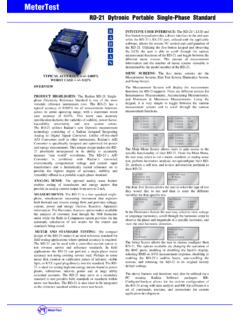Transcription of 'NEW YORK DOCK: FACT OR FICTION - blet602.org
1 "NEW york dock : fact OR FICTION ? ARE YOU TRULY PROTECTED?"SUBMTTED BY:DR. JAMES R. MCDONNELLPROFESSOR EMERITUSARBITRATORU. S. COURT OF APPEALSNEW york dock - NOVEMBER 7, 1979(360 60; AFF'D 609 83)For those interested in the historical background on the various consolidation of railroad operations, pleaserefer to this case, especially, Pages entire matter begins with the Emergency Railroad Transportation Act of 1933 and concludes with theNew york dock Railway SUMMARY OF THE PROVISIONSOFNEW york dock RAILWAY V ,NOVEMBER 7, 1979 New york dock is the name of a labor protective arrangement that offers up to six years of wages and benefitsto unionized railroad employees who are adversely affected by a transaction approved by the SurfaceTransportation Board (formerly the Interstate Commerce Commission).
2 Transactions covered by New york dock include mergers, acquisitions, and line sales to Class I Does 'ADVERSELY AFFECTED' Mean?You are adversely affected when you are placed in a worse position due to an STB-approved must be a direct connection between the transaction and the adverse effect. DISMISSED EMPLOYEE OR DISPLACED EMPLOYEE Being a DISMISSED employee means that you: Have been deprived of employment because of the transaction; Have been furloughed as a direct result of the transaction; Have been bumped, and subsequently furloughed, by another affected employee; Cannot hold a position through the full exercise of a DISPLACED employee means that you: Have been placed in a worse position as it relates to compensation and work rules because of the transaction; Have been required, due to the transaction, to exercise your seniority to a lower-rated POTENTIAL NEW york dock BENEFITSNew york dock provides up to six years of protection, not to exceed years of service.
3 The allowance for adismissed employee is based on the earned compensation for the 12 full months preceding the date deprived ofemployment due to the transaction. This calculation would not include time off for injury or absenteeism. Thisdismissal allowance would be subsequently adjusted for any general wage allowance for a displaced employee would be the difference in earnings in the 12. month period precedingthe date displaced by the transaction. As in the dismissal allowance, the calculation is based on earnedcompensation, so time off for injury or absenteeism would not be included. This displacement allowance isalso subject to adjustment for any general wage should be noted that a dismissed employee has the option of collecting a separation allowance in lieu of allother benefits.
4 This separation allowance is equal to 360 days pay, and the employee must elect to resign fromthe company within seven days of being dismissed in order to collect the Are Employees Required to Do Under New york dock ?TO COLLECT NEW york dock BENEFITS, YOU MUST: Follow your work (including relocation, if necessary); Exercise seniority to the fullest; Accept comparable employment not requiring a change in residence, including in a different craft; Be available for overtime; Exercise seniority to a higher-rated position if there is a addition, section 4 of the conditions provides, in pertinent part:Each transaction which may result in a dismissal or displacement of employees or rearrangement of forces,shall provide for the selection of forces from all employees involved on a basis accepted as appropriate forapplication in the particular case and any assignment of employees made necessary by the transaction shall bemade on the basis of an agreement or decision under this section 4.
5 If at the end of thirty (30) days there is afailure to agree, either party to the dispute may submit it [to arbitration].The departure from an easily administrable rule to a flexible standard will create a great deal of emphasis onthe arbitration process. (Because of the unpredictable state of the law, it seems that employers and employeeswill arbitrate virtually every displacement allowance claim.) Moreover, because of the deference accordedarbitrators by the ICC and the deference accorded the ICC by the Circuit, arbitrators are likely to drawthe boundaries of the New york dock conditions. The law will thus develop on an ad hoc, factually intensebases and will likely remain uncertain for the foreseeable , Gottlieb, GeorgeWashington Law ReviewJune-August, 1996 SUPREME COURT OF THE UNITED STATESM arch 19, 1991 Norfolk & Western Railway Train Dispatchers Association(499 117,111 1156)EXEMPTIVE LAWS FOR CARRIERS INVOLVED IN MERGERS APPROVED BY THE the Interstate Commerce Commission (ICC) has approved a rail carrier consolidation under theconditions set forth in Chapter 113 of the Interstate Commerce Act (Act), 49 11301 et seq.
6 , a carrierin such a consolidation 'is exempt from the antitrust laws and from all other law, including State and municipallaw, as necessary to let [it] carry out the transaction ..," 11341(a). In these cases, the ICC issued ordersexempting parties to approved railway mergers from the provisions of collective bargaining : The 11341(a) exemption "from all other law" includes a carrier's legal obligations under acollective-bargaining agreement when necessary to carry out on ICC approved transaction. The exemption'slanguage, as correctly interpreted by the ICC, is clear, broad, and unqualified, bespeaking an unambiguouscongressional intent to include **1158 any obstacle imposed by determination makes sense of the Act's consolidation provisions, which were designed to promoteeconomy and efficiency in interstate transportation by removing *118 the burdens of excessive Interstate Commerce Commission has the authority to approve rail carrier consolidations under certainconditions.
7 49 11301 et seq. A carrier in an approved consolidation "is exempt from the antitrustlaws and from all other law, including State and municipal law, as necessary to let [it] carry out " 11341(a). These cases require us to decide whether the carrier's exemption under 11341(a)"from all other law" extends to its legal obligations under a collective bargaining agreement. WE HOLDTHAT IT happened? Work is moved; Dispatchers made supervision without rights of union carriers notified the American Train Dispatchers' Association, the bargaining representative for certainN&W employees, *122 that they proposed to consolidate all "power distribution"-the assignment oflocomotives to particular trains and facilities-for the N&W-Southern operation. To effect the efficiency move,the carriers informed the union that they would transfer work performed at the N&W power distribution centerin Roanoke, Virginia, to the Southern center in Atlanta, Georgia.
8 The carriers proposed an implementingagreement in which affected N&W employees would be made management supervisors in Atlanta, and wouldreceive increases in wages and benefits in addition to the relocation expenses and wage protections guaranteedby the New york dock conditions. The union contended that this proposal involved a change in the existingcollective-bargaining agreement that was subject to mandatory bargaining under the Railway Labor Act.(RLA), 44 Stat. 577, as amended, 45 151 et seq. The union also maintained that the carriers wererequired to preserve the affected employees' collective bargaining rights, as well as their right to unionrepresentation under the ICC HELD THAT THE MOVEMENT OF WORK WAS LEGITIMATE SINCE IT WAS PART OF APLANNED, APPROVED Commission also held that because the work transfer was incident to the approved merger, it was"immunized from conflicting laws by section 11341(a).
9 " Ibid. Noting that "[i]mposition of the collectivebargaining agreement would jeopardize the transaction because the work rules it mandates are inconsistentwith the carriers' underlying purpose of integrating the power distribution function,' the Commission upheldthe decision to override the collective-bargaining agreement and RLA provisions. Id., let CASE: CSX'S ACQUISITION OF CHESSIE SYSTEM, INC AND ITS IMPACT ON THEBROTHERHOOD OF RAILWAY CARMENIn August 1986, the consolidated carrier notified respondent Brotherhood of Railway Carmen that it plannedto close Seaboard's heavy freight car repair shop at Waycross, Georgia, and transfer the Waycross employeesto Chessie's similar shop in Raceland, Kentucky. The carrier informed the Brotherhood that the proposedtransfer would result in a net decrease of jobs at the two shops.
10 Pursuant to New york dock , the carrier andthe union negotiated concerning the terms of an agreement to implement the transfer. The sticking point in thenegotiations involved a 1966 collective-bargaining agreement between the union and Seaboard known as the"Orange Book." The Orange Book provided that the carrier would employ each covered employee andmaintain each employee's work conditions and benefits for the remainder of the employee's working life. TheBrotherhood contended that the Orange Book prevented CSX from moving work or covered employees fromWaycross to PARTIES MOVED UNDER TEE GUIDELINES PROVIDED BY NEW york dock . THEYUPHELD TEE CARRIER AND IT WAS APPEALED TO TEE ICC UPHELD TEE PROCEEDINGS, IN MATTER RETURNED TO THE COURTS, WHICH SAID,The court held that 11341(a) does not authorize the Commission to relieve a party of collective-bargainingagreement obligations that impede implementation of an approved transaction.






